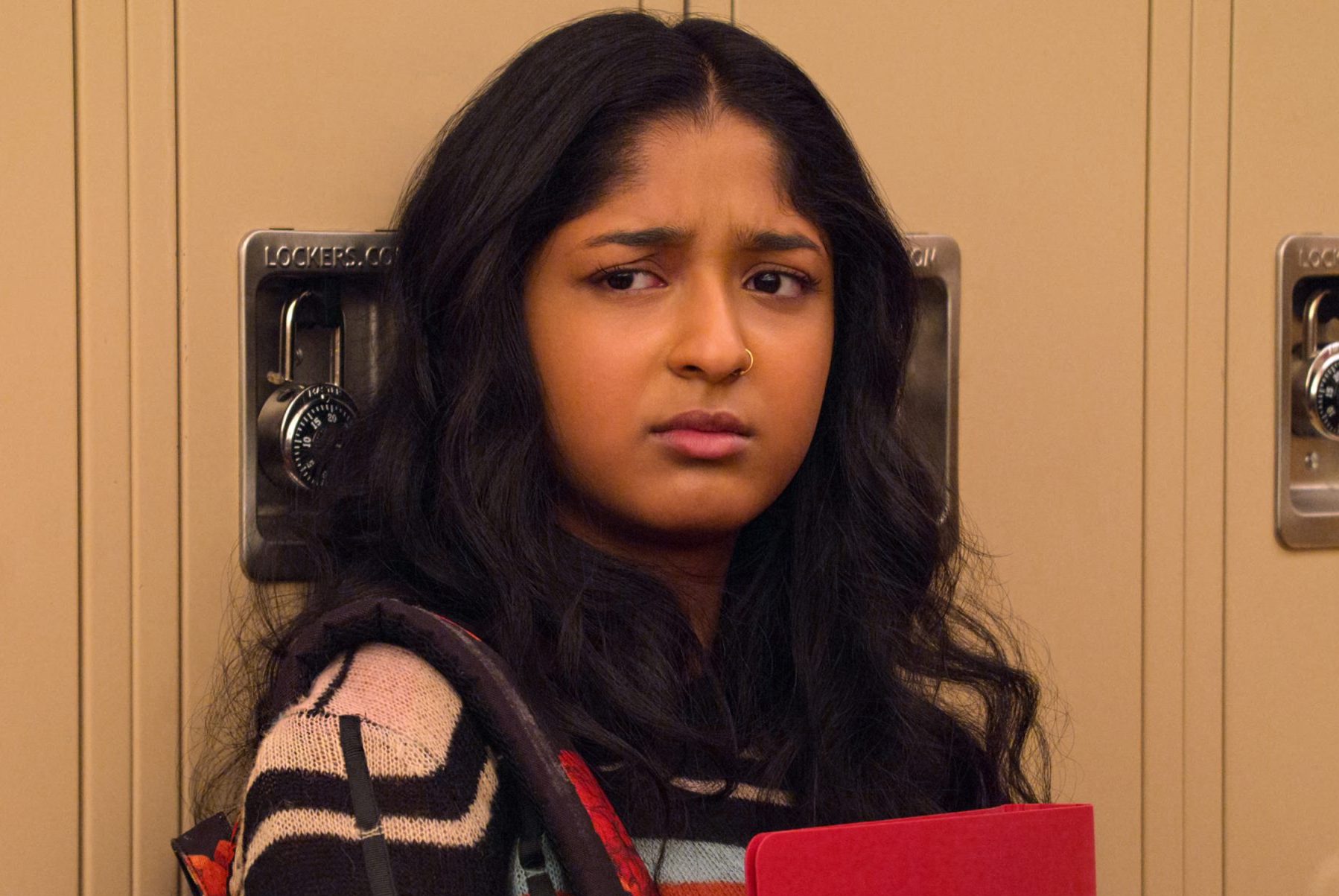Warning: Some spoilers for “Never Have I Ever’ ahead
As Season 2 of Mindy Kaling’s beloved teen sitcom “Never Have I Ever” opens on the same Malibu beach that last season’s tear-jerking finale ended on, it becomes clear that Devi Vishwakumar has messed up big time — yet again.
Minutes after surrendering her father’s ashes to the ocean, Devi (Maitreyi Ramakrishnan) is kissing her lifelong academic rival, Ben Gross (Jaren Lewinson). Her decision to kiss Ben punctuated the satisfying ending to the enemy-to-lovers storyline brewing between them last season.
There is just one problem. Devi spent every other episode of Season 1 preoccupied with winning over the gorgeous upperclassman Paxton Hall-Yoshida (Darren Barnett), who didn’t care to notice her. Devi has always been labeled by her peers as an “uneffable nerd.” To them, she is nothing but crazy. She pursued Paxton in her pursuit to change herself. Watching Devi painfully try to reinvent herself for Paxton only to repeatedly get hurt by him made her spark with Ben feel like the only necessary payoff in her situation. It was the classic wrong-guy-versus-right-guy rom-com realization that made Ben seem like the only viable option for Devi at the conclusion of Season 1.
But Season 2 seeks to prove that its own previous bias toward Ben was a gross oversight. As the season begins, Devi and Ben’s sweet moment is predictably interrupted by Devi’s over-bearing, Tamil-Indian mother, who is none-too-pleased to see her daughter kissing a boy.
Nalini (Poorna Jagannathan) drags Devi from Ben’s car, hilariously demanding of her daughter, “What are you going to do at my funeral? Just have sex on top of my grave?”
Just from this opening scene, “Never Have I Ever” Season 2 proves that it will continue to follow in Season 1’s footsteps, retaining all its original charm by effortlessly balancing high school drama with family expectations while also mixing high-intensity stakes with comedic quips. Devi, a reckless and popularity-obsessed teenager, will once again bring upon herself a series of self-inflicted conundrums.
Just like Season 1, Season 2 never lets Devi lose sight of her truest heartbreak — the premature death of her father. In fact, Devi’s anti-heroine tendencies only increase in frequency and severity this season. Her trauma will not simply disappear because she finally has what she wants — a boyfriend. Well, make that two boyfriends.
Dreamy Paxton is not yet out of the running. As Devi’s mother berates her during the car ride home, she realizes that Paxton has left her a voicemail and is waiting for her at home. The guy she has so long lusted after does care for her after all.
Just like that, Devi veers back into her rash decision-making of last season. By nature, teenagers are irrational, moody and self-centered. But Devi takes these characteristics to an extreme. Instead of choosing between the two possible love interests, Devi decides to date both of them in secret.
The audience can sense from the beginning that Devi won’t get away with her two-timing escapades, and predictably, her triumph does not last for long. In fact, it only lasts for the duration of one episode after she accidentally publicly reveals her actions in front of both of them. To make matters worse, in an almost comically cliché rom-com moment, Devi ends the night by inadvertently causing Paxton to get hit by a car.
As it turns out, this dramatic turn of events begins one of the most important character redemption arcs of Season 2. There is an emotional journey ahead for Paxton this season, as he attempts to look past his pretty-boy exterior and jock label, coping with his newly discovered feelings for Devi and the “chaos and confusion” she brings into his life.
Fans have long-anticipated this glimpse into Paxton’s character. Season 1 dedicated an entire episode to Ben, so it was only natural that Season 2 delve deeper into Paxton. Ben’s episode was whimsically narrated by comedian Andy Samberg, but it succeeded in garnering sympathy for the once one-dimensional, obnoxious show-off character. This interlude also de-centered Devi’s perspective in a way that felt like a necessary reprieve last season.
Instead of featuring Paxton’s episode later in the season as they did for Ben, “Never Have I Ever” used the third episode as the appropriate time to begin Paxton’s redemption. Paxton’s plot becomes integral to the remainder of Season 2’s story in many ways. This episode is no doubt an early stand-out of the second season, featuring guest narrator Gigi Hadid.
Although Paxton’s character already breaks boundaries as an Asian leading man and love interest, it was time for his character to have more than a pretty face. Throughout the episode, Paxton undeniably becomes a more likable and self-sufficient character. Paxton and Devi even begin to mend their fractured relationship and become friends again. Some firm #TeamBen supporters never expected to appreciate the formerly superficial Paxton the way they did this season.
But Paxton’s story proves that “Never Have I Ever” is different from most other high school coming-of-age dramas. The series uses its characters to uplift minority voices and struggles in a way that makes the series refreshingly modern.
Just as Season 1 focused on Devi’s Indian American identity and featured characters with identity struggles that included coming out of the closet, Season 2 uses Paxton’s arc to delve into Japanese American history.
With the introduction of Paxton’s plotline comes the entrance of a loveable new character — Paxton’s ojichan. This character is incorporated smoothly into the series when Paxton decides he must finally apply himself to his schoolwork and no longer rely on his athleticism for his future. Paxton uses his grandfather’s time in Japanese internment camps as a starting point to boost his grades. Ojichan reflects on the value of telling stories and confronting painful histories in a way that lends a serious edge to the series.
But it is not just Japanese American culture that gets a spotlight this season. The series also expands to touch on Muslim identity and body dysmorphia, especially in how it affects perception-obsessed teenagers.
Further adding to the ensemble of hilarious Indian women on this show is Megan Suri, who joins the cast as the new transfer student Aneesa. Aneesa proves herself to be cool and effortlessly popular, once again subverting a rom-com stereotype by establishing that South Asian women can play the “popular girl” role too. Even though Aneesa is ridiculously kind to Devi, she feels threatened by her. Not only do their classmates begin to mistake them for one another as the only Indian girls in school, labeling Aneesa “Devi 2.0,” Aneesa is also earning Ben’s attention in a way that makes Devi’s blood boil.
During a particularly low moment for Devi after being mistaken for Aneesa yet again, she blurts in a rage-fueled meltdown, “I don’t run fast, I’m not cool and I don’t eat like one crumb of brownie because I’m straight up anorexic.” In one impulsive moment, Devi messes up majorly once again. The difference is that this time, her actions do not just hurt herself, but somebody who did not deserve to be dragged into it. Arguably, this is Devi’s biggest blunder to date.
But Aneesa is not just a device to elevate the stakes of Devi’s actions; she is a much-needed step forward in terms of sitcom representation. Aneesa reveals the multi-faceted identity issues that come with being a South Asian woman. The character reveals that because of her Muslim heritage and the cultural practice of wearing clothing that covers her skin, the only thing she felt she could control about her appearance was her weight.
“Never Have I Ever” handles this sensitive subject with amazing fortitude and care. Not only is the viewer made to understand Aneesa’s struggles, Devi is made to repent again and again for revealing Aneesa’s secret. Each episode that discusses Aneesa’s eating disorder even comes with a disclaimer at the end, offering for viewers to get help if they themselves are struggling. Aneesa’s plotline and Devi’s meddling with her personal trauma not only reflect the struggles of real high schoolers, but they also lead the series to darker, more meaningful territory than it has ever explored previously.
While it can be amusing to get caught up in Devi’s whirlwind love triangle, the true heart of “Never Have I Ever” lies in its impeccable ability to not shy away from discussions of what truly makes up identity. Every character on the show is unique and marks an important step forward for minority representation on television, especially in the realm of shows typically marketed for teens.
Despite her flaws, Devi’s bold embrace of her own immaturity makes her a likable character to many fans, especially those who don’t identify with either side of her love triangle but rather root for Devi’s personal development; even though each season respectively makes a case for both sides of the love triangle, some fans are neither #TeamBen nor #TeamPaxton.
Almost rebelliously, some fans of the show proclaim themselves to be #TeamDevi. As this season ultimately emphasizes to viewers, Devi is just a kid attempting to heal from trauma by throwing herself into high school drama. She is understandably going to fail to be a good person from time to time, as it is part of growing up. This begs the question of where potential future seasons will find Devi. Will she eventually learn from her repeated mistakes or will each season feel like a recycled version of the last?
According to the series producer Lang Fisher, there are still many possibilities to explore. Who Devi ends up with is still anybody’s guess. Fisher even boldly stated that maybe Devi will end up choosing “neither.” Lang told ET that the writers are on neither side of the love triangle as, after all, the characters are still “high schoolers” who “don’t have to end up together.” Fisher also says that perhaps Season 3 would feature Devi attempting to navigate her own expectations with reality, “figuring out how to be in a real relationship.”
Regardless, there seems to be no doubt that after the brilliant follow-up of Season 2, fans can expect to not be let down if the series returns for more in the future. “Never Have I Ever” will continue to deliver comedy, feel-good romance, much-needed on-screen diversity and a unique heroine who proves that it is okay to not be perfect.

















